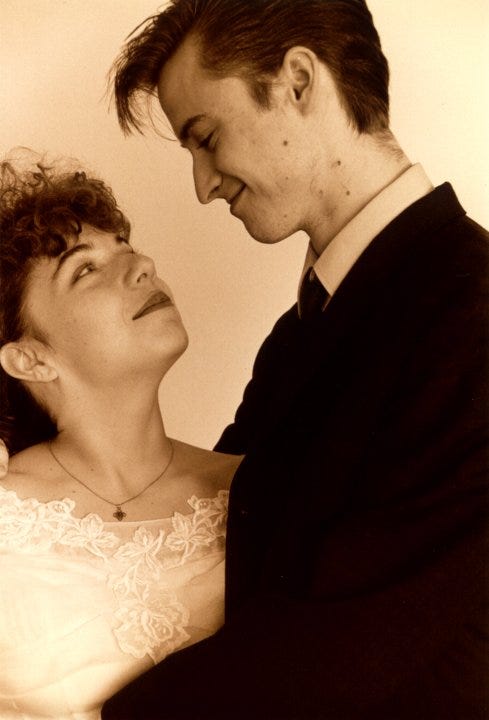Where we live - why they visit
"You should expect grace, that which makes life more than manageable, but you look elsewhere, seeking some delight other than that. Your conscious being, with what you've been given, should be like a beautifully laid-out park with wildflowers and cultivated wonders, a swift stream with secluded places to sit and rest beside it. When a grieving person sees you, he or she should recognize a refuge, refreshment, a generous house where one need not bring bread and cheese. There will be plenty."
From "The Drowned Book" the Ma'rifa of Bahauddin, Rumi's father (translated by the always brilliant team of Coleman Barks and John Moyne)
A wise friend of mine liked to say, "Being determines consciousness" - which accords very well with the lovely French phrase acknowledging that "professional deformation" happens to many people's character, as we approach our days with a particular operative mindset, over a period of many years.
One of the most interesting and stimulating things about the world, is how many different ways there are to live and to understand our lives. We learn something about this every time we make a new friend - and the more their experience is unlike ours, the more they have to share with us.
Travel and study can also open our perspective very helpfully. But contrary to cliche, it is entirely possible to do quite a bit of this looking-about and still remain shallow - especially when we get into the habit of insisting that our rushed surface judgements are more important than open, humble and patient slow-building witness.
More recently we have another problem interfering with our understanding, because the old categories and descriptions aren't clear and separate anymore. Many people describe themselves as followers of a creed, but don't limit themselves by its principles in any meaningful way at all - rather, they like their adopted doctrine, for how it empowers their anger.
We've gone so far into crazy-land that it is now possible to believe religiously in "zero harm to all life" and yet boost genocide. This means that you can call yourself a secular humanist, a progressive leftist, a feminist and internationalist, and people still don't really know where you stand on much of anything.
I can't help flashing on 'The wizard of Oz' - The real question we so often want to ask is - "Are you a good witch, or a bad witch?" And though this is a bit of a digression, it's a helpful one.
The world of the mystical and occult is vast and incredibly diverse - and includes many masterworks and modes of study with a cultural density and active energy very hard to find elsewhere. Worth remembering also that the word 'Occult' is about as specific as 'Schizophrenic' - most easily defined by everything that can be shown to be outside its catch-all set.
But while we can gain much spiritual, cultural and historical insight - and also contact those interested in carrying forward new work of spiritual reach, there is a strange phenomenon we run into, when we start digging here.
We meet some of the nicest, cleverest, deepest, most interesting and big-hearted people - and then we also encounter some of the creepiest, most narcissistic, sadistic and imbalanced weirdos imaginable (often well-beyond our previously imaginable standards).
Even shared interest in clearly wise and beneficent content does not, sadly, give us much of a clue about the informing character behind their passion.
Crazy Kids in love
My wife Catherine and I are a strange pair - and we've always been proud of having our own unique definitions and goals, whether or not they fit the popular ideas of the time. But our oddness isn't intellectual posturing, we got this way honestly by hard knocks, working the funny angles, and plenty of love and patience.
The longer you live, the more likely you are to watch your close friends forced to cope with frightening challenges, or go through them yourself. I also find myself increasingly embarrassed complaining, because there is always someone in worse shape still, (and they are frequently held up to shame us, with their superior courage and bearing). ;o)
So - I'm not even going to get into our specific challenges - you've already got or seen your own - I'm just going to count on you the reader to tap your empathic storehouse and connect. The important point is this - we were incredibly lucky to find true love while young, but we have not ever been able to take anything since for granted - not one single day in thirty-five years.
The list of things that "Everybody" does, and assumes everyone else does also, which we cannot, is huge - but so too is our awareness of how many people have always been left outside of that cheerfully presumed everybody, for as many reasons as there are frailties, bigotries and ignorances.
Facing the certainty of never-ending uncertainty, we decided not to deny but rather learn from and build our strength here, reject bitterness and go for love, compassion and understanding. It's a weird mental spot to occupy though - many find it rather uncomfortable - a little too profound for the day to day high-elbows game of making your way in the cutthroat world.
A lot of cultures have elaborate rituals for dealing with illness and grief which segregate them, and keep them from disturbing everyday commerce (and assist the illusion that many fewer are troubled than is really so).
Even in the modern age this applies - many people who are going through the worst time of their life, suddenly find all their old friends turning away, unable to handle the emotional load, the problem which can't just be fixed, and the implications for their own mortality.
Catherine and I do not turn away. We recognize and bear witness with them. Not trying to 'help' to make ourselves feel better, but simply being the people we know are often needed at times like this. Compassionate and understanding.
There is a whole separate thesis to be explored, when it comes to the number of people who first turn to spiritual matters and creative pursuits, when they are forced to face a mortal or heartbreaking challenge.
But we love art and creativity, we're open and interested spiritually, and we aren't afraid of grief and pain. So, for a time, our hearth becomes a precious refuge and a source of hope and nourishment.
"No one ever died wishing they'd put in one more day at the office"
But while linear models can be used to describe many things - human behaviour does not seem to be one of them. Suppose I ought to mention 'cycles' first, since that's the traditional profundity applied - but I say we're just plain loopy!
What happens as the crisis passes, and their old strength returns? (And this, so predictably as to be hilarious) We suddenly turn from precious "how can I ever thank you?" helpers, into a couple of nutcases, insulting them constantly - because while they are anxious to return to their old functional day to day competition-based ignorance, we're still living in profound compassion land.
A place which they were grateful to be able to visit, but now find an uncomfortable reminder of weakness and unexplored questions of the soul that might just undermine everything shiny they're after!
And then there is this - to me, the most philosophically interesting part of the whole thing.
The particular point most often seized upon, as angry rebuke to the very same sympathy and kindness they once enjoyed. When they realize that we were helping them not because we saw them as the unique and special centre of the universe, but because that is our loving way, and we act on our principles.
So insulted - how dare you have principles!
The love we offered was entirely real - but it was never aimed at the preening ego who now wants to steer again, and forget they ever peered at whole new levels of potential depth and participation in life.
Our love is for the resplendent unlimited and beautiful soul inside them - freed from the prison of persona for a short while, in their crisis - but which they are now impatient to go back to shackling and insulting, full-time.
I like to think that their soul remains glad we love them, even if their individualist-competitor persona now resents it as an encumbrance. But even if they do remain glowery forever, it bothers me not.
Helping each other out of difficult crises in whatever ways our skills allow is one of our basic human duties and ways to embody real gratitude. Like art, craft, love and friendship - definitely in the 'stuff we're here for' category.
I haven't got the back-strength to lift someone to my shoulders and get them out of physical danger. But now and then, when we're firing on all cylinders, between Catherine's incredible heart-warming cooking and sweet listening, and my freakish store of oblique lore and recontextualizing humour, we do manage to help a little bit, to lift an unfortunate soul in terrible pain up and out of the heat.
Which is a cool result - as far as we're concerned.
We'll take effect over credit, every single time.
¯\_(ツ)_/¯
I feel better already (and there's more in the oven)






